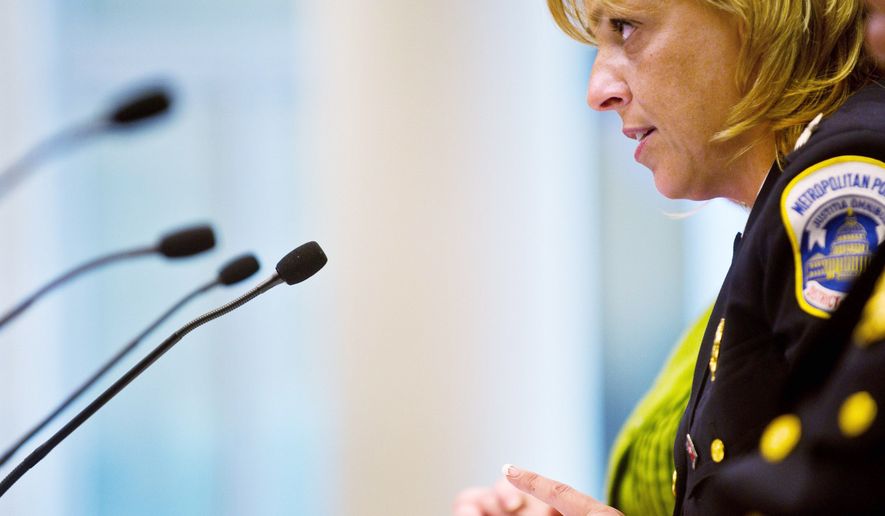Believe it or not, actress Hilary Duff and Nation of Islam minister Louis Farrakhan have something in common: Both enjoyed a D.C. police escort before bad-boy celebrity Charlie Sheen highlighted the muddled policy issue in April, according to a ranking Metropolitan police officer.
A D.C. Council committee hearing Thursday highlighted confusion over when a police escort is warranted and suggested the true policy had been buried in orders circulated around the Metropolitan Police Department.
It also revealed confusion within the MPD over the conditions required to authorize a celebrity escort.
“The biggest issue here, I think for everybody, has to be the lack of clarity,” said council member Phil Mendelson, at-large Democrat, after the hearing.
Mr. Mendelson, chairman of the Committee on Public Safety and the Judiciary, called the hearing to clarify the MPD’s policy for escorting celebrities, after Mr. Sheen touted a high-speed ride on April 21 from Washington Dulles International Airport in Virginia to the District.
The actor was running about an hour late for a scheduled performance at DAR Constitution Hall. Mr. Sheen tweeted a photograph indicating that the police vehicle accompanying his vehicle was speeding and using emergency lights.
Reports of more than a dozen other celebrity escorts kicked off a series of unclear comments on how police select deserving candidates for an escort.
Cmdr. Hilton Burton of the Special Operations Division (SOD) told the committee on Thursday that escorts had been provided to celebrities such as Billy Joel and Paul McCartney, despite the police chief’s post-Sheen assertion they were reserved for presidents, vice presidents and visiting heads of state.
“I advised my chain of command that this was not the case, and that SOD had regularly done escorts of sports teams and some celebrities since I became commander of SOD and that this practice had been standard operating procedure for a number of years,” said Cmdr. Burton, who testified on behalf of himself and not the department.
Chief Cathy L. Lanier countered that is hardly the case, noting policy dictates a high-ranking officer must approve escorts for celebrities or other special cases, which are reimbursed by the requesting party and use off-duty officers.
Celebrity escorts could be authorized under rare circumstances, she said. For instance, a Britney Spears appearance in 2003 had been labeled a security issue because it was on the Mall.
Chief Lanier said an officer at the rank of inspector or higher should sign off on any special-request escorts. They have the experience and accountability that is required for those decisions, she said.
Mr. Mendelson noted the guidelines for escorts contained in an obscure 1974 general order that begins with parking issues and in a 2005 order that deals with accounting for reimbursements may not have been highlighted in the right way.
Chief Lanier said it is every officer’s responsibility to know the general orders, but she is working on a new policy while the department investigates the Sheen incident.
Mr. Mendelson, who noted the Office of the Inspector General is also looking into the Sheen affair, said he would like to see a draft policy by September.
Kristopher Baumann, chairman of the Fraternal Order of Police unit that represents many D.C. officers, said the issue is a “window into the dysfunction of the police department.”
“The effect of that is just poison in the police department,” Mr. Baumann said. “There is no other job that is scrutinized at the level the police are.”
Officers who accepted and approved a request from Mr. Sheen’s promotions team said the policy, as it stands, is unclear.
Officer Stanley Radzilowski said he got a call from the promoter, who he knew from previous events in the city, at 2:45 p.m. The promoter said Mr. Sheen would be late because of a court appearance in Los Angeles earlier in the day.
The officer’s superior, Lt. Stuart Emerman, said he authorized the escort because of concerns about the large crowd waiting at the downtown hall. Neither officer approved the “Code One” aspect that led to the reported sirens and high speeds of the escort.
Chief Lanier, who did not delve into the ongoing investigation, said reports of reckless driving were what distressed her most.
The chief expressed concern over certain escorts listed by officers who testified prior to her, noting that she had served as commander of the Special Operations Division prior to becoming chief and during the period the officers referred to.
“You’ll find nothing from me approving Hilary Duff,” she noted after the hearing.
Mr. Baumann aired his suspicions after the hearing, contending the chief should have at least known about the escorts through monthly reports.
Chief Lanier pointed to numerous times in which a celebrity was denied an escort. When actress Fran Drescher’s team asked for an escort owing to her designation as an envoy at the State Department, the MPD said no.
It also rejected a last-minute request from Jon Stewart’s people for an escort out of the city after the comedian’s popular Rally to Restore Sanity last fall, according to Lt. Emerman.
The chief said it is difficult to draft a blanket policy for escorts, because the scenarios vary.
She said police usually escort holiday events like the Santa Claus toy drive, and that a traditional Indian wedding once warranted a police presence because “an elephant is part of the ceremony on public space.”
• Tom Howell Jr. can be reached at thowell@washingtontimes.com.




Please read our comment policy before commenting.